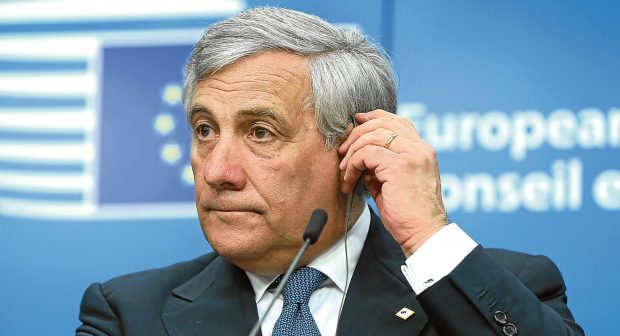Antonio Tajani – a man you have never heard of, yet who is one the most powerful men in Europe – has spilled the beans.
The Italian conservative is president of the European Parliament and admitted the EU “fears” a Europe of small nations.
He was speaking before the vote in Lombardy for more powers for the north Italian region, and in reference to the Catalonia stand-off.
Mr Tajani said what everyone has long known: the EU doesn’t like anyone rocking the boat. Bids for autonomy or independence by parts of EU member states are democracy too far for Brussels, who like to think they are in control of our destinies.
Mr Tajani’s remarks to an Italian paper should have been headline news in Scotland, yet I can’t find any mention of them. This is odd, as the question of whether democracy beats bureacuracy is vital to Scotland’s future, and for that of the Europe.
Mr Tajani thinks a community of, say, 50 states is unworkable, and wants to protect the Franco-German-dominated EU that we know and do not love today.
At first appearance, the struggle in Catalonia appears pointless. If Catalonia is independent, beyond the governmental and economic confusion it may cause in the short term, what is actually gained?
Catalonia wants to be in the EU, respect all global treaties and engage in free trade and peaceful co-existence – just as it is now.
The Catalans also appear selfish – their push for independence is partly based on the idea that they are rich and the rest of Spain poorer.
So far, so Scottish – the desire to change in order to stay the same, partly driven, by some, in a grubby belief in hoarding local wealth.
Yet there is more to both examples, a quality shared by people across the continent. They don’t like how things are and want government closer to the people.
Mr Tajani is saying that is the wrong way to go – he despairs of an EU with many nations, thinking decision-making would become impossible.
He’s right that this is the official, if unsaid, view of the EU – but is profoundly wrong.
We know the European Union is in crisis because one big nation wants to leave – Britain – while lots of smaller parts want to break from their member states.
It is textbook institutional stupidity to try to hold on to the past when revolutionary forces are demanding something new.
The discontent with governmental structure in Scotland, Spain and Italy – and as expressed by Brexit – is a real thing and needs a real answer.
Feudalism
It may not feel like the revolutions of 1848, when monarchs wept at the demands of the people.
It does not have the drama of the socialist demands in the early 20th Century, and it lacks the horror and magnitude of a Second World War which heralded massive social change.
That said, the democratic revolutions witnessed across Europe are just as important. This is the next phase in Europe’s slow march from feudalism to real democracy.
The people are trying to build a new set of structures – often ad hoc, confused and ill-planned but driven by a sincere reaction to the world as it is.
When a global system dominates economics far more than any government, and this system determines the rise and fall of jobs, wages and living standards, then you don’t need a 19th Century state to govern you.
What you need is membership of an economic bloc that gives you power on the global stage – the EU – but for the people within that bloc to organise and identify as they please.
Mr Tajani is against this mosaic structure of Europe because he sees it as a bureaucratic nightmare. His mistake is thinking we need a large European bureaucracy. We don’t. What we need is an effective European parliament and to do away with the Council of Europe and the European Commission. In short, we need to be more like a United States of Europe than the current EU.
That is clearly what the leaders of Lombardy, Scotland and Catalonia are saying, even if the message is often confused.
Barcelona
The upside of a reformed EU is that it would give people the sense of being heard, the protection of a large bloc and the comfort of shared aspirations across the continent.
It is democratic self-determination working to its logical conclusion – liberated citizens within a regulated, peaceful society.
The strings? Membership of any club comes at a cost, and for a community to work you need to redistribute from the rich areas to the poor.
In short, dreams of avarice from independence are always going to be thwarted if you want to cooperate with continental neighbours. And everyone needs to be using the same currency under the same rules.
Lastly, Barcelona and Edinburgh can’t simply become the new obstacles to democracy – devolution has to work to the scale that the people choose – so Shetland’s bid is just as serious as Scotland’s.
It is ironic that Mr Tajani is president of the European Parliament, given he is not listening.
The history of Europe shows the people usually get their way eventually.
